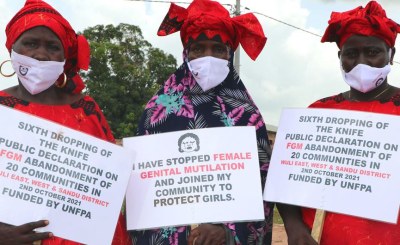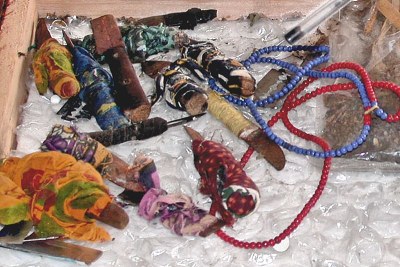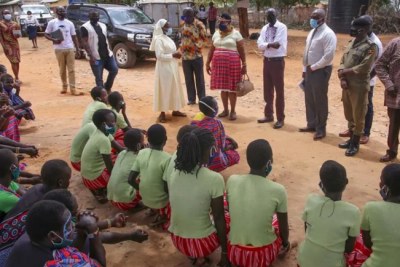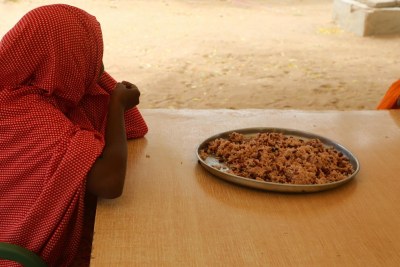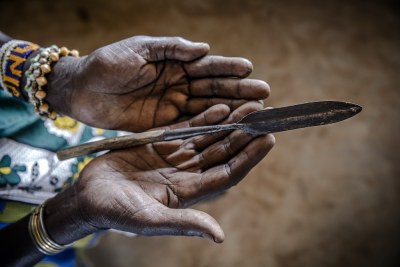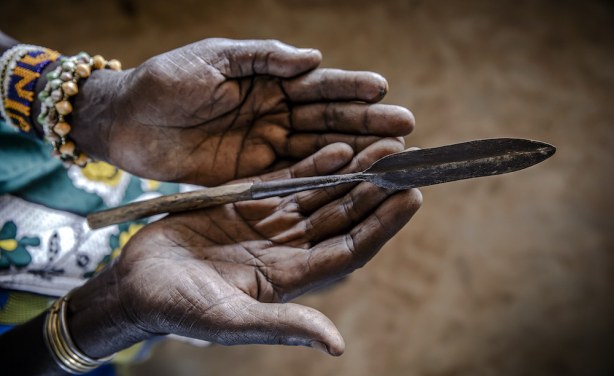-
Africa: FGM Responsible for Increased Deaths in Some African Countries - Report
Premium Times, 17 August 2023
The study shows that FGM remains legal in five of the 28 countries where it is most practised. Read more »
-
Nigeria: FGM Only Causes Pain, Harm to Female Child, Stakeholders Insist
Vanguard, 15 August 2023
Stakeholders advocating against Female Genital Mutilation, FGM, have called called on those still carrying out the barbaric act to put an end to it, insisting that it is a crime… Read more »
-
Africa: AU and UN Galvanize Media Support to End Harmful Practices By 2030
FrontPageAfrica, 3 August 2023
The African Union Commission Department of Health, Humanitarian Affairs and Social Development (AUC-HHS) in collaboration with the Spotlight Initiative Africa Regional Programme… Read more »
-
Kenya: Medicalization of FGM Making It Hard in the Fight Practice in Kisii
Capital FM, 31 July 2023
Despite the efforts put in place by governments, organizations and individuals in combating and fighting against Female Genital Mutilation (FGM)through legislation and education,… Read more »
FGM Linked to Increased Deaths in African Countries, Report Says
A new study has found that Female Genital Mutilation (FGM) is a leading cause of death in the countries where it is practised. FGM remains legal in five of the 28 countries where it is most practised.
The study, conducted by UK universities, highlights that FGM contributes to more deaths in these nations than any other causes except for enteric infections, respiratory infections, and malaria.
The research analysed the numbers of girls subjected to FGM in Benin, Burkina Faso, Cameroon, Chad, Cote D'Ivoire, Egypt, Ethiopia, Guinea, Kenya, Mali, Niger, Nigeria, Senegal, Sierra Leone, and Tanzania. The study found that FGM increases the risk of death for girls and young women by 50% and that it leads to an estimated 44,320 excess deaths per year.
Globally, over 200 million women and girls have been subjected to FGM - a practice that often happens in unsanitary conditions and without clinical supervision with consequent severe pain, bleeding, and infection. It is known to lead to obstetric complications, a reduction in sexual function, and other long-term physical and mental health problems.
The World Health Organisation (WHO) estimates the aggregate cost of medical treatment for girls and women after FGM was U.S.$1.4 billion in 2018. However, until now, there has been no systematic evidence about the role of FGM in the global epidemiology of child mortality - reflecting difficulties in measuring the practice.
InFocus
-
In Kenya, girls are mostly subjected to 'the cut' - the removal of parts of the external female genital organs for non-medical reasons, during the school holidays. They Read more »
-
Female genital mutilation (FGM) and child marriage are illegal in Uganda and Kenya, yet the practices persist. A fourteen-year-old Ugandan girl and five others, were allegedl Read more »
-
Girls as young as twelve years old are being forced into child marriage and Female Genital Mutilation (FGM) at "alarming rates" in the Horn of Africa, as the most severe drought in ... Read more »
-
Nigeria's Minister of Women Affairs Pauline Tallen, has said that for the county to achieve a majority of the United Nations Sustainable Development Goals by 2030, it must ... Read more »
